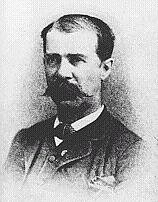[cross-posted at Liberty & Power]
I’ve put the first half of Dyer Lum’s 1890 The Economics of Anarchy online. More to follow!
 I first heard of Dyer Lum from Frank Brooks, best known in libertarian circles today for his 1994 anthology of selections from Benjamin Tucker’s Liberty. When I met Frank, around 1986, we were both grad students at Cornell (he in political science, I in philosophy), and we carpooled together down to my first IHS conference as he told me about this oddly named fellow he was writing his dissertation on. (Though in a movement that includes Lysander Spooner, Wordsworth Donisthorpe, Anselme Bellegarrigue, and Voltairine de Cleyre, perhaps “Dyer Lum” isn’t such an odd name.)
I first heard of Dyer Lum from Frank Brooks, best known in libertarian circles today for his 1994 anthology of selections from Benjamin Tucker’s Liberty. When I met Frank, around 1986, we were both grad students at Cornell (he in political science, I in philosophy), and we carpooled together down to my first IHS conference as he told me about this oddly named fellow he was writing his dissertation on. (Though in a movement that includes Lysander Spooner, Wordsworth Donisthorpe, Anselme Bellegarrigue, and Voltairine de Cleyre, perhaps “Dyer Lum” isn’t such an odd name.)
Lum was a mutualist anarchist along lines broadly similar to Tucker’s, a kind of fusion of Spencer and Proudhon, though Lum had a more optimistic view of the prospects for unions as vehicles of the labour movement. (He also preferred Buddhism to Stirnerism – the Absence-of-Ego and Its Own? – but that aspect of his thought doesn’t come out in this work.) Apparently Lum and de Cleyre collaborated on a long anarchist novel, the manuscript for which has been maddeningly lost. Judging from The Economics of Anarchy, I find Lum a less clear writer than either Tucker or deCleyre – but still a fun read.
Coming tomorrow: the Bastiat-Proudhon debate!